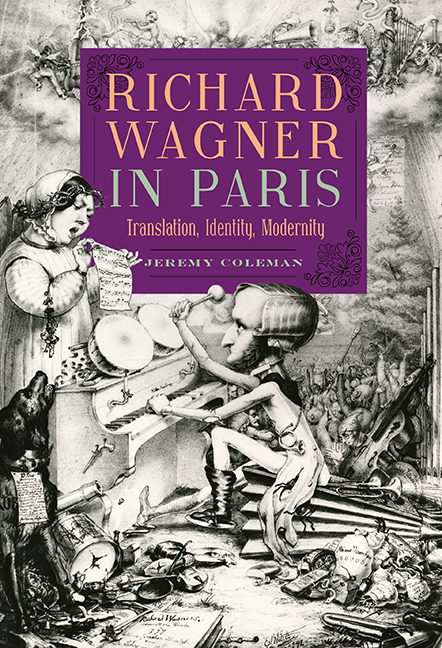Book contents
- Frontmatter
- Dedication
- Contents
- List of Illustrations
- List of Music Examples
- Note on the Text
- Acknowledgements
- Abbreviations
- Introduction: Wagner Against the Grain
- PART I PARIS YEARS, 1839–42
- 1 Through Babel's Arcades: Early Entanglements
- 2 Translating German Opera: Le Freyschütz
- PART II DRESDEN AND ZURICH, 1842–52
- PART III PARIS YEARS, 1859–61
- Conclusion: Universality at the Crossroads
- Bibliography
- Index
2 - Translating German Opera: Le Freyschütz
from PART I - PARIS YEARS, 1839–42
Published online by Cambridge University Press: 25 March 2020
- Frontmatter
- Dedication
- Contents
- List of Illustrations
- List of Music Examples
- Note on the Text
- Acknowledgements
- Abbreviations
- Introduction: Wagner Against the Grain
- PART I PARIS YEARS, 1839–42
- 1 Through Babel's Arcades: Early Entanglements
- 2 Translating German Opera: Le Freyschütz
- PART II DRESDEN AND ZURICH, 1842–52
- PART III PARIS YEARS, 1859–61
- Conclusion: Universality at the Crossroads
- Bibliography
- Index
Summary
ON 7 June 1841, Weber's Der Freischütz received its first performance at the Académie royale de musique in a French translation by Émilien Pacini (under the title Le Freyschütz) with recitatives by no less than Berlioz. In many respects, the production rapidly became embroiled in debates about opera translation and cultural interface well beyond Wagner's immediate orbit, specifically the early nineteenth-century transfer of German Singspiel to Paris. Alexandra Campana has described how during the nineteenth century Freischütz “acquired the status of a locus classicus of transnational operatic encounters”. Wagner's critical responses to the production – his preview article for the RGMP (see Abbreviations) and subsequent review for the Dresden Abendzeitung – remain some of the production's most memorable accounts today. Rather than read Wagner's articles as a skewed witness to reception history in the hope of shedding light on the production, however, this chapter aims to consider the multiple textual versions of the essays within a broader historical frame and the changing significance of the production for Wagner himself as he negotiated his own Parisian projects.
In his pieces of cultural criticism written in Paris, Wagner was clearly aping the satirical prose style of his compatriot Heinrich Heine, exiled in Paris from 1831. But, as Susan Bernstein acutely noted, the similarity with Heine extends to the ways in which Wagner functioned precisely as a cultural mediator and interpreter (in other words, as a translator) between France and German states. Thus Heine wrote the series of articles under the title of Französische Zustände for German readership, in the manner of a foreign correspondent, while Die romantische Schule and De l'Allemagne were intended for the French. If Wagner has acquired a reputation as a mouthpiece of German cultural nationalism denouncing French superficialities, the ironic tone so often adopted in these essays and articles lays those texts open to radical ambiguities regarding his identity as well as his critical evaluations.
Theories and discourses of literary translation of the early nineteenth century tended to originate in German-speaking rather than Francophone contexts. Is it even possible to reconstruct a French discourse of translation of the first half of the nineteenth century?
- Type
- Chapter
- Information
- Richard Wagner in ParisTranslation, Identity, Modernity, pp. 51 - 74Publisher: Boydell & BrewerPrint publication year: 2019



